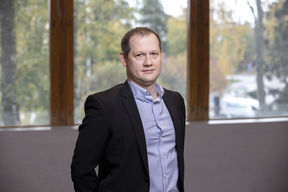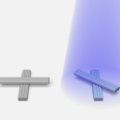Research project develops electrically controlled artificial molecular machines

A major new research project at Aalto University sets out to develop artificial molecular machines controlled by electrical fields. Molecular machines are tiny structures that power biological systems such as our bodies. Researchers have long known that the ability to artificially manufacture such machines would have vast potential for nanotechnology and lead, for instance, to much more precise medical diagnostics and more effective therapy. So far, however, real-world applications are still a long way off.
‘The problem is, how do you control things that are organized on such a very small scale? You cannot just take tweezers and move the components around, so you have to design some kind of a control scheme,’ Associate Professor Anton Kuzyk explains.
A majority of demonstrated artificial molecular machines are controlled by applying chemicals to, or shining light on, the structures. Kuzyk’s project turns to electrical fields instead. Electronically controlled molecular machines would be faster as well as easier to manufacture, as they would not need to rely on sophisticated chemical synthesis.
‘An additional benefit of using electrical fields is that one can control molecular machines remotely, simply by pressing a button’ Kuzyk says.
Although some research on electrically controlled molecular machines exists, the field remains largely unexplored. Recently, Kuzyk himself has studied the way that light can be used for the remote control of synthetic DNA-based nanostructures. The present project builds on a similar methodology, but will develop a novel control mechanism.
‘This will hopefully establish a new route for building functional nanoscale reconfigurable molecular assemblies,’ Kuzyk says.
Although applications are not topical yet, Kuzyk mentions the development of ultra sensitive detection techniques for diagnostics as one possible field that the new research could contribute to, and faster and more robust plasmonics displays as another.
Kuzyk emphasizes, though, that at this point we can only speculate about specific applications.
‘A lot of the motivation for this research comes from looking at how biological systems function, from these amazing natural molecular machines that we know are incredibly useful. We still don’t know how artificial analogues should be built and, frankly, what they should do -- we are just learning the first construction principles. Later, we will have a better idea of what functionality can come out of this’.
The five-year project has just received a European Research Council funding of approximately 2 million euros.

Read more:
Tiny origami controlled by light
Nanosized hinges can fold and unfold on command

Read more news

Unite! Seed Fund 2026: Open for applications
The 2026 Unite! Seed Fund call is officially open, offering funding across three strategic lines: Student Activities, Teaching and Learning, and Research and PhD. Deadline for applications is 20 March 2026.
Apply now: Unite! Seed Fund 2026 - Student Call
The Unite! Seed Fund call for 2026 is now open for students. Apply now for up to €20,000 per project, involving at least two Unite! Universities. Deadline for applications is 20 March 2026.






